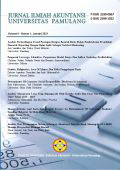KESADARAN SPIRITUAL AKUNTAN PUBLIK: HIJAB DIRI DARI PENYIMPANGAN AKUNTANSI
DOI:
https://doi.org/10.32493/jiaup.v10i1.14431Keywords:
Kesadaran Spiritual, Skandal Akuntansi, Akuntan Profesional, Perilaku, Materialistik-EgoistikAbstract
Penelitian ini bertujuan untuk mengkaji kesadaran spiritual akuntan publik untuk membebaskan diri dari skandal akuntansi. Peneliti menyoroti bahwa perilaku akuntan publik yang tidak etis (materialistis) merupakan faktor penyebab terjadinya skandal akuntansi. Oleh karena itu, diperlukan konsep baru, yaitu pengetahuan tentang Tuhan sebagai landasan moral. Artinya, setiap urusan ruhani tidak akan ada artinya jika tidak didahului dengan ilmu Allah. Oleh karena itu, penelitian ini menggunakan konsep diri spiritual. Ini adalah konsep orang yang sempurna yang memiliki kesadaran holistik. Melalui kesadaran, akuntan publik mengalami kesadaran akan Tuhan untuk membimbing akuntan publik menjadi manusia yang sadar spiritual.References
Blacburn, S. 2001. Being Good: A Short Introduction to Ethics: Oxford University Press.
Caras, A. 2013. Ethics and Supervision Process – Fundaments of Social Work Practice. Procedia – Social and Behavioral Sciences, 92 (Lumen), 133.
Delaney, C. 20. The Spirituality Scale: Development and Psychometric Testing of A Holistic Instrument to Assess the Humen Spiritual Dimension. Journal of Holistic Nursing, vol 23 no. 2: hal 145-167.
Delgado, C. 2005. A Discussion of the Concept of Spirituality, Nursing Science Quartely, vol 18 (2): hal 157-162
Desphande, SP dan J Jacob, 2009, "Impact of Emotional Intelligence, Ethical Climate and Behavior of Peers on Ethical Behavior of Nurses". Journal of Business Ethics 2009, p 403-410.
Drucker, P. F. 1996. Landmarks of Tomorrow. Piscataway, NJ: Transaction Publishers.
Duchon, D., dan D. A Plowman. 2005. Nurturing the Spirit at Work: Impact on Work Unit Performane. The: Leadership Quarterly, vol 16: hal 807-833.
Durkhem, E. 2011. The Elemetary Forms of The Religious Life: Sejarah Bentuk-Bentuk Agama yang Paling Dasar. Jogjakarta: IRCiSod.
Efferin, S. 2016. Sistem Pengendalian Manajemen Berbasis Spiritualitas. Surabaya: Rumah Peneleh Sari Media dan Literasi.
Ertin, A. 2017. Jati Diri Perempuan dalam Islam. Bandung: Mizan.
Falah, S, 2007. Pengaruh Budaya Etis Organisasi dan Orientasi Etika Terhadap Sensitivitas Etika (Studi Empiris Tentang Pemeriksaan Internal Oleh Bawasda). Simposium Nasional Akuntansi X. Unhas Makassar. 26-28 Juli. www.perbanasinstitute.ac.id (diakses`tanggal 14 Maret 2009).
Griffin, R.W. dan R.J. Ebert. 1998. Business, Fourth Ediition. Prentice Hall Inc. Englewood.
Horomnea, E and Maria, A, P. 2012. Ethical and Morality in Accounting Epistemological Approach. The Journal of Eastern Europe Research in Business & Economics, Article ID 405721, 1-11. http://www.ibimapublishing.com/journals/JEERBE/jeerbe.html.2012.
Ingersoll, R, E. 2003. Spiritual Wellness in The Workplace. In Handbook of Workplace Spirituality and Orgtanizational Performance. Ed.R.A. Giacalone and C. L Jurkiewicz, 289-299. Armonk, Ny: M. E. Sharpe.
Johnson, K., dan D.R. Ord. 2022. A spirituakity for the 21 st Century: Inevitabilities and Possibilities. Kosmos: journal for Global Transformation.
Latif, l. 2018 Makrifat Pagi: Percik Embun Spiritualitas di Terik Republik. Bandung: Mizan.
Ludigdo, L. 2005. Mengembangkan Etika di Kantor Akuntan Publik: Sebuah Perspektif Utuk Mendorong Perwujudan Good Governance. Konferensi Nasional Akuntansi. Universitas Trisaksi.
Ludigdo, L. 2007. Paradoks Etika Akuntan. Yogyakarta: Pustaka Pelajar.
Marques, J.F. 2008. Spirital Performance From An Organizational Perspective. The Starbucks Way. Corporate Governance: The International Journal of Business in Society, vol 8 (3): hal 248-257
Marta, J, A Singhapakdi & K Kraft, 2008, “Personal Characteristics Underlying Ethical Decisions in Marketing Situations; A Survey of Small Business Managers. Jounal of Smallâ€, Business Management 46 (4), p 589-606.
Maryani, T. Dan U. Ludigdo. 2001. “Survey atas Faktor-Faktor yang Mempengaruhi Sikap dan Perilaku Etis Akuntanâ€. Jurnal tema 2(1), 49- 62.
Sahal, A. 1994. Kemudian, dimanakah emansipasi? Tentang teori kritis., genealogi dan dekonstruksi, Kalam edisi 1: 12-22.
Scaupp, D.L. dan M.S. Lane. 1992. Teaching Business Ethics: Bringing Reality to the Classroom. Journal of Business Ethics 11: 225-229
Schilit, H. M. 1984. Deviant behavior and misconduct of professionals. The Woman CPA, 46(2), 20−25.
Scwhartz, M,S. 2002. A Code of Ethics For Corporate Code of Ethic. Journal of Business Ethics 41: 27-43
Simpton, PM; Banerjee, Debasish; Simpson Jr, Claude L, 1994, “Softlifting: A Model of Motivating Factors.†Journal of Business Ethics 136. p 431.
Sulistiyo, A. B. 2004. “Komitmen profesi dan Komitmen Organisasi Sebagai Variabel Intervening Dalam Hubungannya Antara Kerja Islami dan Sikap Terhadap Perubahan Organisasiâ€. Tesis Magister. Undip. Semarang.
Triyuwono, I. Akuntansi Syariah: Perspektif, Metodologi dan Teori. Jakarta: PT. Grafindo Persada.
Turner, BS. 2012. Relasi Agama dan Teori Sosial Kontemporer. Jogjakarta: IRCiSoD.
Widyastuti, W dan Ludigdo, U. 2010. Pengaruh Kecerdasan Emosional, Kecerdasan Spiritual dan Budaya Organisasi Terhadap Perilaku Etis Auditor pada KAP. Jurnal Akuntansi Multiparadigma. 1(1), 141-151.
Downloads
Published
Issue
Section
License
Authors who publish with this journal agree to the following terms:
- Authors retain copyright and grant the journal right of first publication with the work simultaneously licensed under a Creative Commons Attribution License that allows others to share the work with an acknowledgement of the work's authorship and initial publication in this journal.
- Authors are able to enter into separate, additional contractual arrangements for the non-exclusive distribution of the journal's published version of the work (e.g., post it to an institutional repository or publish it in a book), with an acknowledgement of its initial publication in this journal.
- Authors are permitted and encouraged to post their work online (e.g., in institutional repositories or on their website) prior to and during the submission process, as it can lead to productive exchanges, as well as earlier and greater citation of published work (See The Effect of Open Access).
JIAUP: Jurnal Ilmiah Akuntansi Universitas Pamulang have CC-BY-SA or an equivalent license as the optimal license for the publication, distribution, use, and reuse of scholarly work.
In developing strategy and setting priorities, JIAUP: Jurnal Ilmiah Akuntansi Universitas Pamulang recognize that free access is better than priced access, libre access is better than free access, and libre under CC-BY-SA or the equivalent is better than libre under more restrictive open licenses. We should achieve what we can when we can. We should not delay achieving free in order to achieve libre, and we should not stop with free when we can achieve libre.


 PUBLICATION ETHICS
PUBLICATION ETHICS FOCUS AND SCOPE
FOCUS AND SCOPE EDITORIAL TEAM
EDITORIAL TEAM REVIEW PROCESS
REVIEW PROCESS CONTACT US
CONTACT US AUTHOR GUIDELINES
AUTHOR GUIDELINES






